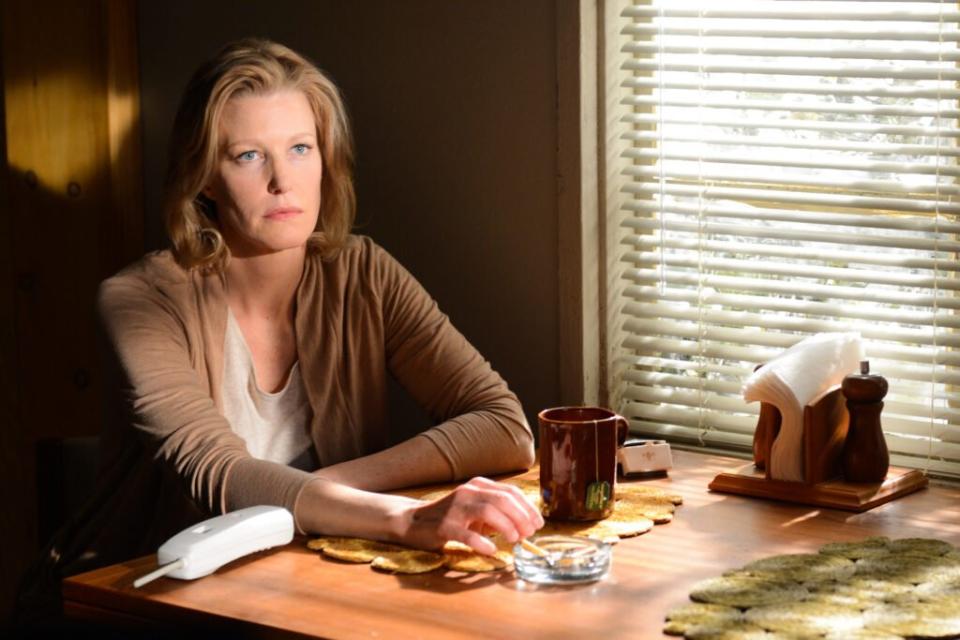‘Better Call Saul’s Kim Wexler and the Sexism of the Anti-Heroine
- Oops!Something went wrong.Please try again later.
- Oops!Something went wrong.Please try again later.
- Oops!Something went wrong.Please try again later.
- Oops!Something went wrong.Please try again later.
“I learned my lesson. I’m never going to write for less-than-perfect women ever again; less-than-likable [women].”
That’s a quote from Breaking Bad creator and Better Call Saul co-creator Vince Gilligan way back in 2014 during that summer’s Television Critics Association press tour. He said it before the public had seen as much of a second of the then-much-anticipated prequel to his Emmy-winning drama about a high school chemistry teacher (Bryan Cranston’s Walter White) who creates the finest methamphetamine Albuquerque, New Mexico, has ever seen.
Said in his trademark folksy “Aw shucks, y’all” Virginia twang, Gilligan’s comment was meant to be read as sarcasm. It was a rebuttal against a misogynistic subset of Breaking Bad fans who had decided that the true villain of that marvelous show wasn’t America’s broken healthcare system or even Walter White himself (or Jesse Pinkman or Gus Fring or Tuco…) — and the greed and power that overtook him as he rose up the ranks of the drug-dealing industry — but Walt’s wife, Skyler (Anna Gunn).
Skyler, the way these fans saw her, was holding Walt back from greatness. She was too smart and too angry and too — ugh — shrill to simply be a drug kingpin’s devoted wife and be grateful that he was trying to provide for their family. Before she knew about his illegal activities, she attempted to find legal means to fund her husband’s medical treatments, like an online charity or asking their rich friends, Gretchen and Elliott, for help. When she finds out about her husband’s side business, she doesn’t tell the cops or file for divorce. She is scared of what her husband will do if she goes public, as well as what his new business associates might do to her and their two kids. So she goes for a more subtle, and castrating way to tell her spouse that he cannot control her: She sleeps with her old boss (remember clumsy Ted?) and tells Walt about it. Even when she accepts the situation and tries to help by suggesting Walt use his former employer, a car wash, as legitimate business to aid their money laundering, she’s seen as undermining Walt’s great mind.

Nevermind that, in the final episodes of the series, Walt abandons Skyler and their kids to hide out far away in an off-the-grid cabin and grow a ridiculous beard.
The crime drama ended in 2013 and, to this day, you can still find memes, a Facebook page, and think pieces that not only discuss a hatred of Skyler but also pick apart Gunn’s own looks and appearances.
Which brings us to Kim Wexler, the pony-tailed bootstrapper played to near-perfection by Rhea Seehorn on Better Call Saul and the character to which Gilligan was referring to when he said that line at TCA.
In the six seasons of Saul, which returns from hiatus on July 11 to begin its run of the series’ final few episodes, we’ve seen that Kim and Skyler are not that different. Yes, they’re both blonde and smoke when nervous. But there’s more to the comparison. An attorney who eventually realized her moral compass was too strong for the kind of business law she’d been practicing, Kim also learned young that she had to be smart enough to be one move ahead of her adversaries. She isn’t as distracted (and destructed) by a promise of a lucrative payday as her spouse, Jimmy (Bob Odenkirk’s can’t-stay-clean criminal attorney who is known better in some circles as Saul Goodman). As a pro bono attorney in the courts system, she’ll tell a white lie to her clients if she knows that’s the only way to get them to do what’s best for them. And she used her words and glares to stand up to Tony Dalton’s drug lord Lalo Salamanca when he came to her home to intimidate her husband (Editor’s note: Dalton’s mustache may be the best on TV.).

Where Kim and Skyler do differ, widely, is when it comes to how well they are willing to play their husbands’ games. Kim is eased into Jimmy’s scheming when things aren’t as dangerous; she’s uncomfortable when his way to save some skin was to fabricate evidence with a made-up fetish called a “Hoboken squat cobbler.” When she eventually gets a taste of a con herself, it’s hard to quit — especially when it doesn’t seem that serious and it’s just manipulating a slimy stockbroker over expensive tequila. The only reason she married Jimmy was because of the spousal privilege it afforded them if either of them (most likely he) were ever caught. Their relationship often seems so platonic that IndieWire once made a list of the few times they were actually seen kissing on screen. Sex only seems to happen after the adrenaline rush of a mark taking the bait, such as in the first half of the final season when they’re necking in the background after a conference call confirms their long con has paid off.
But Kim’s devotion to Jimmy, and to his elaborate and nonsensical antics, jeopardized her own attempts to do good by the law and to work with a foundation that could help many people who cannot afford quality legal care. Even more terrifying: Kim knows about Jimmy’s connections to a more alarming clientele than just petty thieves (read: the cartel) and still stands by her man, at least publicly. (Privately, she is concerned — and rightfully so after she finds the coffee mug she gave him, itself a symbol of their unconventional and competitive relationship, riddled with bullet holes after one of his stunts goes so horribly awry he’s forced to lug two duffel bags of money through the desert).
The fact that Skyler is hated and Kim is celebrated highlights the dichotomy of the Bad universe. Saul has been called a “feminist” show because of Kim. And, it’s true that Kim’s unflinching brassiness — even when taking on someone as terrifying as Lalo Salamanca while her husband stands there sputtering — is empowering. Her character has grown from one that always appeared to be pouting into that of a badass, taking and talking down to one man after another. But both Kim and Skyler are anti-heroines in the same way that Mary-Louise Parker’s Nancy Botwin was on Showtime’s Weeds, Viola Davis’ Annalise Keating was on ABC’s How To Get Away with Murder or Keri Russell’s Elizabeth Jennings was on FX’s The Americans.
All started with the need, or purpose, to protect themselves and those they held most dear. All caused, or witnessed, bloodshed as a result of their actions.
Only one dared to cross the man who was the series protagonist.
The post ‘Better Call Saul’s Kim Wexler and the Sexism of the Anti-Heroine appeared first on SPIN.

